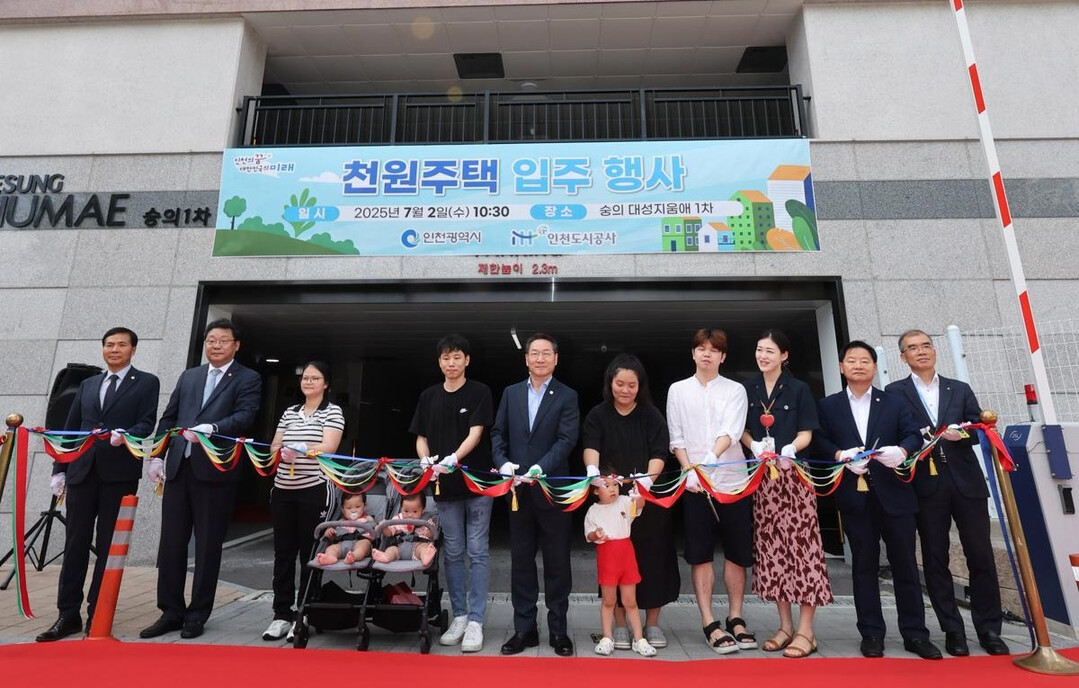
INCHEON, South Korea – Incheon's highly anticipated "1,000-Won Housing" initiative has officially begun welcoming its first residents, marking a significant milestone exactly one year after the policy's initial announcement. This groundbreaking housing support program, designed to alleviate the financial burden on newlyweds, is a cornerstone of Incheon City's efforts to address declining birth rates and promote stable family environments.
On July 2, Incheon City hosted an entry ceremony at one of its "1,000-Won Housing" units in Sungui-dong, Michuhol-gu. Mayor Yoo Jeong-bok personally attended the event, touring the units with incoming residents and their families, underscoring the city's commitment to the program.
Choi Ji-woo, a 34-year-old prospective resident, expressed his pleasant surprise during his visit to his new home. "Honestly, I didn't have high expectations for '1,000-Won Housing' because of the name, but I was genuinely shocked by how good the house is," Choi said. For Choi, the most significant advantage is the drastic reduction in his monthly rent, from 280,000 won to a mere 30,000 won.
Choi, accompanied by his wife, 4-year-old son, and 11-month-old twin daughters, expressed immense satisfaction after inspecting their future home. The Choi family successfully navigated a competitive 7.36:1 application process to secure their spot. They are scheduled to move into their 77-square-meter unit, featuring three bedrooms, on July 16.
"We decided to apply for the 1,000-Won Housing because it's a newly built complex and close to our children's daycare," Choi explained. "Our biggest goal is to consistently save the money we're saving on rent and eventually buy our own home."
A Year in the Making: From Policy to Reality
The "1,000-Won Housing" program is a unique housing subsidy initiative by Incheon City, offering rental homes to newlywed couples for a nominal daily rent of 1,000 won (approximately 30,000 won per month). This policy directly targets the significant housing cost burden often cited as a contributing factor to the nation's low birth rate.
The program operates through two primary models: "Purchased Lease" (매입 임대) and "Jeonse Lease" (전세 임대). In the Purchased Lease model, Incheon City directly leases out public housing units it owns to eligible newlywed couples. The Jeonse Lease model offers a more flexible approach: eligible couples can select a private residential unit they desire, and Incheon City will then enter into a jeonse contract (a lump-sum deposit housing system common in Korea where no monthly rent is paid) with the landlord on behalf of the couple, effectively leasing the property to them.
For the current year, Incheon City plans to provide a total of 1,000 housing units to newlywed couples, with 500 units allocated to each of the Purchased Lease and Jeonse Lease categories. The first phase of the program saw 200 households selected for Purchased Lease units, with whom Incheon City finalized contracts last month. These residents are required to move in within 60 days of their contract date, initiating the full-scale occupancy that began this month. The remaining eligible residents for Purchased Lease units are expected to move in sequentially until October. The selection of Jeonse Lease residents is slated for announcement at the end of this month, with their move-ins anticipated by the end of the year.
Overwhelming Demand and Future Expansion
The "1,000-Won Housing" initiative garnered an overwhelming response from the public, with over 5,500 applications submitted for the total of 1,000 available units. The Purchased Lease category, with 500 units on offer, saw a staggering 3,681 applications, resulting in a highly competitive average ratio of 7.36 applicants per unit. The Jeonse Lease category also experienced significant demand, with 1,906 applications for 500 units, yielding a competition ratio of 3.81:1.
Incheon City attributes this robust enthusiasm not only to the exceptionally low rental costs but also to the high quality of the housing units, with the majority being newly constructed buildings, less than a year old. This commitment to providing modern and comfortable living spaces has significantly contributed to the program's popularity. Encouraged by the initial success, Incheon City plans to continue the "1,000-Won Housing" policy next year, with an additional 1,000 units slated for supply.
Joo Hyung-hwan, Vice Chairperson of the Presidential Committee on Low Birth Rate and Aged Society, who attended the entry ceremony, emphasized the broader impact of the initiative. "Incheon City's 1,000-Won Housing, which can drastically reduce the housing burden for newlywed couples, is a policy that we hope will spread widely and help families preparing for marriage and childbirth," Joo stated.
Incheon Mayor Yoo Jeong-bok reiterated the city's ongoing commitment to supporting its residents. "We will continue to actively pursue various housing policies to ensure that newlywed couples can plan their future in a stable environment," Mayor Yoo affirmed.
This initiative serves as a model for other local governments grappling with demographic challenges. By directly addressing one of the most significant financial hurdles for young couples, Incheon is not only providing affordable housing but also fostering an environment conducive to family formation and growth. The success of the "1,000-Won Housing" program highlights the effectiveness of targeted policies in mitigating societal issues and improving the quality of life for its citizens.
[Copyright (c) Global Economic Times. All Rights Reserved.]




























